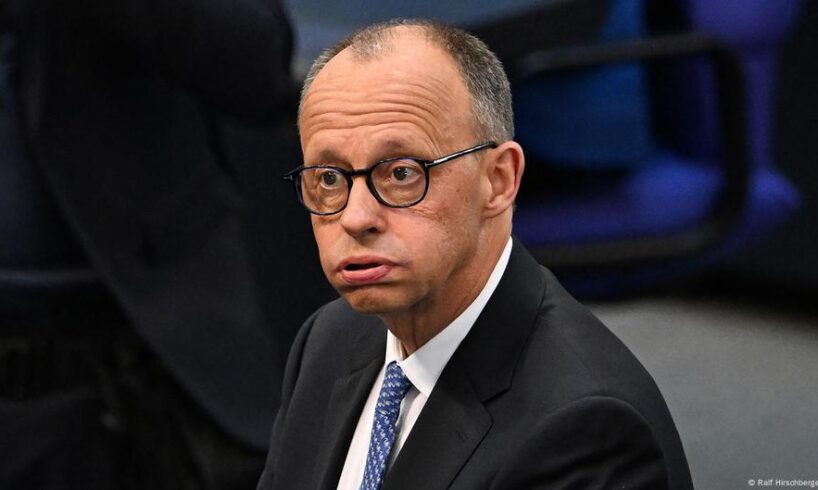
Infighting over the budget, the financing of social security benefits and climate protection projects led to the collapse of Germany’s previous coalition government of the center-left Social Democrats (SPD), environmentalist Greens and neoliberal Free Democrats (FDP) in November 2024.
Back then, Friedrich Merz was the opposition leader in the Bundestag federal parliament. He took every opportunity to criticize the government for its squabbling. They were undermining people’s trust in politics, he said.
Less than a year later, Merz is chancellor and his coalition, of the conservative Christian Democrats (CDU) and their Bavarian sister party the Christian Social Union (CSU) and the SPD, is likewise quarrelling. Again, the conflicts center on budgetary holes and social policy.
Merz insists that Germany can no longer economically afford its welfare state in its current form.
That’s “bullshit” replied SPD Co-leader and Labor Minister Bärbel Bas in a speech to the SPD youth wing. This was seen as a strikingly crude choice of words for a minister to direct at her chancellor.
What has Merz achieved during his first 100 days in office?
To view this video please enable JavaScript, and consider upgrading to a web browser that supports HTML5 video
Voters unimpressed by coalition conduct
The monthly Deutschlandtrend survey commissioned by German public broadcaster ARD found that 77% of those surveyed were dissatisfied with how the CDU/CSU Union and SPD get along.
Supporters of the CDU/CSU and the SPD were equally dissatisfied, according to the survey, which polled 1,342 eligible German voters on September 1 and 2.
Respondents also had little good to say about the government’s work so far. Some 75% of them indicated that they didn’t like what the government was doing.
Voters had been equally unsatisfied with the previous government under Chancellor Olaf Scholz of the SPD. But supporters of Chancellor Merz’s CDU/CSU bloc are happier now, with 57% of them saying they are satisfied with the work of the current government. Only 25% of SPD voters could say the same.
The coalition government’s focus on a tougher approach to migration policy and economic relief measures is an explanation for this increased satisfaction. These topics are of prime importance to CDU/CSU voters.
Which reforms are fair?
In the coming months, the government intends to switch its focus to reforms in social, employment and tax policy. The CDU/CSU Union is pushing for cuts to Bürgergeld (citizens’ income) welfare payments that cover needs for the long-term unemployed and top-ups for the working poor. The SPD opposes this and would rather raise taxes on the wealthy and top earners.
Harsher sanctions on Bürgergeld recipients who repeatedly fail to take up acceptable job offers were welcomed by 80% of those surveyed. There was also significant support for raising taxes for high earners and large inheritances.
On the other hand, most respondents were in favor of tax relief for overtime pay and the income of retirees who continue to work.
Plans to change the maximum working hours from daily to weekly were received less enthusiastically and raising the retirement age to 70 was rejected by 84% of survey respondents.
Reforms are urgently needed. Despite the billions in debt that Germany is taking on in the coming years, the country faces gaping holes in its budget. In 2027, it is predicted that €30 billion ($35 billion) in savings must be made.
There will have to be cuts in the welfare state, Chancellor Merz said, referring to health and nursing care as well as old-age pension systems that are all propped up by state funding.
Germans are expected to have to work beyond the current retirement age of 67 and may see pension levels go down
People’s opinions are divided when it comes to their own prosperity and money problems in their senior years.
After several years of economic stagnation, concern about Germany as a location for doing business continues to be high. Here, the government has not yet been able to turn around public opinion.
AfD continues to gain ground
The Deutschlandtrend survey also asked about the competency of political parties. The CDU/CSU was widely described as able to solve current problems in foreign and defense policy, economic, tax and finance policy. The SPD led only in the categories of old age pension schemes and social justice.
The far-right Alternative for Germany (AfD) was viewed as the most competent of all parties when it comes to immigration policy. Despite a reduction in the number of refugees coming to Germany, support for the AfD has overtaken the CDU/CSU on this issue. The party, which is in parts right-wing extremist, has also increased its general appeal among voters.
Survey respondents were asked who they would vote for if parliamentary elections were to be held this week.
The CDU/CSU bloc is leading as voters’ preferred party with an unchanged voter share of 27% compared with the previous poll. The AfD is closing in, reaching a new high of 25% (+1 from the previous survey). The SPD has slightly improved (+1) with its share of the vote at 14%. Support for the Greens is slightly down at 11% (-1). The socialist Left Party remained steady at 10%.
Other parties, including the economically left-wing, politically conservative Sahra Wagenknecht Alliance (BSW) with 4% (+1) and the FDP with 3% (-1), currently lack enough votes to pass the 5% threshold to enter the Bundestag.
This article was originally published in German.
While you’re here: Every Tuesday, DW editors round up what is happening in German politics and society. You can sign up here for the weekly email newsletter, Berlin Briefing.





